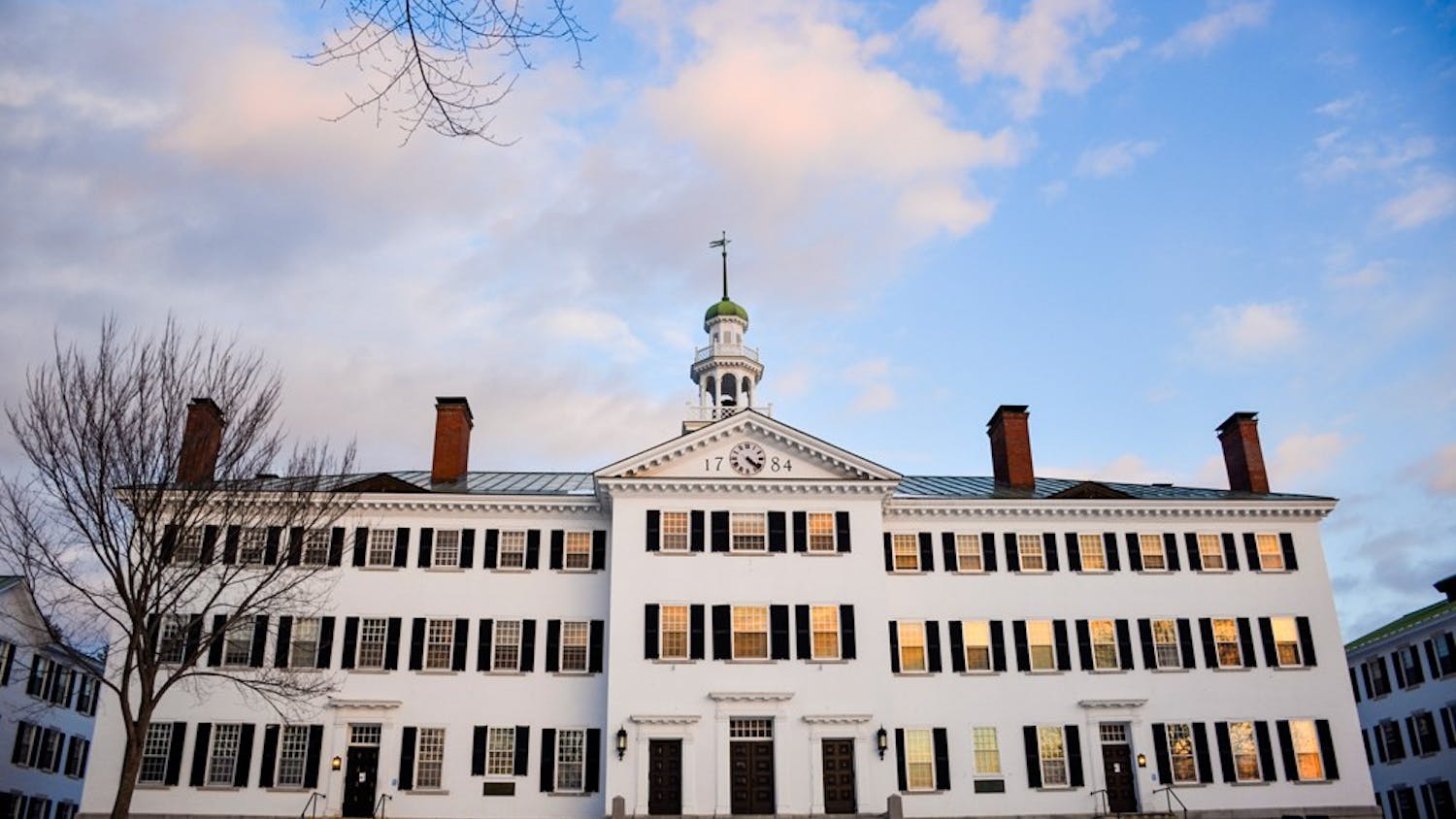Greeting students at one of her final events as Dean of the College, Charlotte Johnson was quick to flash a smile. At a reception recognizing seniors on Wednesday in Collis Common Ground, Johnson mingled with students, embracing those she knew well and welcoming those she hadn’t met.
Two days before, from behind the Parkhurst Hall desk where she has worked for the last three years, Johnson reflected on her time at the College, during which she has seen three College presidents, numerous new initiatives in student life and a raft of negative media attention toward campus climate. Citing improvements in advising, health services, sexual assault resources and residential life, Johnson said that she was proud of the work her office has accomplished, calling her three years at the College personally “transformative.”
In July, Johnson will depart Dartmouth for Scripps College in Claremont, California. During her first year as vice president for student affairs and dean of students at Scripps, a 1,000-student women’s college, Johnson said she hopes to meet every student, a task that she wishes she could have accomplished at Dartmouth. Though she is pleased with the friendships she has made at the College, Johnson said, if given an opportunity to go back she might better prioritize relationship building.
Johnson’s time at Dartmouth was one of frequent transition, with three new presidents arriving at the College. Each time her upstairs neighbor in Parkhurst changed, administrative priorities also shifted.
Former College President Jim Yong Kim, Johnson said, emphasized harm reduction and improving Dick’s House. Carol Folt, who served as interim College president from mid-2012 to mid-2013, focused on strategic planning and oversaw the “Year of the Arts.” College President Phil Hanlon, who assumed office a year ago, has stressed entrepreneurship and fiscal responsibility.
“Every president has his or her own projects or initiatives, and as a senior administrator who reports to the President, you’ve got to be able to flow with that,” she said.
Despite the high turnover, Johnson said, her office maintained momentum on key initiatives, citing sexual assault as one that has carried through administrations. For example, she said, administrators have collaborated with students, faculty and alumni to combat sexual assault “since the day I stepped in the door.”
In March, the College proposed a revised sexual assault policy that would mandate expulsion of those found guilty of sexual assault involving penetration, oral-genital contact or oral-anal contact through force, threat or purposeful incapacitation of a survivor. In a survey conducted by The Dartmouth this spring of 873 current students, nearly 88 percent of respondents approved of this aspect of the proposal.
Not all of the College’s efforts to combat sexual assault have received such positive feedback during Johnson’s tenure. This February, when Johnson announced the Center for Community Action and Prevention, some faculty members criticized the announcement as rushed, citing a desire to provide further input and express their concerns. Johnson reached out to 18 faculty members following the announcement to schedule a meeting to discuss their thoughts on sexual violence and student life issues.
Dartmouth also saw changes in advising during Johnson’s tenure. The centralized advising center in Berry Library and the pilot Advising 360 program that launched in the Choates cluster were both significant improvements, she said. Johnson said that the advising center in Berry Library had led to a 30 percent increase in appointments.
Johnson also noted the hiring of four counselors and increased diversity of the Dick’s House staff as progress in health services.
Along with these achievements, Johnson has experienced her fair share of challenges. In recent years, Dartmouth has received national scrutiny for harmful student behaviors, highlighted by a February 2012 article in Rolling Stone magazine that detailed alleged hazing practices at Sigma Alpha Epsilon fraternity.
This negative media attention, Johnson said, was the biggest challenge of her time at the College.
“Dartmouth is so much more than is portrayed in some of the snapshots that have been taken by the media over the last three years,” she said. “And because I know that, because I know the students, because I know what a great place this is and how much work is being done by dedicated faculty and staff and my colleagues across the board — that has been a bit challenging.”
Much of the criticism Dartmouth has received regarding high-risk drinking and sexual assault has focused on the role of the Greek system. But blanket condemnation, Johnson said, is unwarranted.
“It’s not as easy as targeting one particular group, or one particular set of organizations, and saying, ‘Oh, you’re to blame for all our problems,” she said. “That would be too simple, and I think it would also be inaccurate.”
In her time as dean, Johnson oversaw new administrative policies regarding Greek life. In the fall of 2012, when the College instituted random Safety and Security walk-throughs and increased penalties for hazing, Johnson said she thought “a silent majority” of students supported the changes despite pushback from Greek leaders.
Johnson acknowledged that “there is work to be done” in improving campus climate. In February, a group of students released the Freedom Budget- — an eight-page document outlining more than 70 specific proposals that aim to more equitably distribute power and resources on campus. The students demanded a point-by-point response from the administration and were “extremely dissatisfied” with the response, prompting them to protest President of the College Phil Hanlon’s office one month later.
“Though I understand lots of folks don’t agree with the tactics, including myself, of some of the students who support the ‘Freedom Budget,’ I think it would be folly to ignore what they’re trying to communicate to the institution,” Johnson said. “Which is they don’t feel the sense of ownership and belonging that they believe they ought to feel.”
The issues Dartmouth faces, she said, cannot be solved overnight. To progress, students, faculty and administrators must collaborate, she said, emphasizing the importance of forming partnerships.
Early in her tenure, however, Johnson was criticized as inaccessible and unwilling to meet with students.
In April 2012, Johnson introduced “Talk It Out,” an event that discussed challenges faced by LGBTQ students. She left after two of four speeches, and students were quick to comment on her departure.
“The administration needs to be held accountable for their inaction,” yelled one student in the audience, demanding greater support for LGBTQ students. “Where is Dean Johnson?”
At the time, she said, the community did not know her, and leaving early sent the wrong message.
“I learned a lot from that mistake,” she said. “Symbolism can sometimes be everything.”
Following the event, Johnson penned a letter to the editor in The Dartmouth asking students not to equate her departure with a lack of support for the LGBTQ community. She emphasized that homophobia, bigotry and hatred have no place in the Dartmouth community.
Later that month, Palaeopitus Senior Society launched a Google Moderator forum for students to post and vote on questions for administrators, Johnson answered the questions that received the most votes in online videos.
Johnson said she has worked hard to develop a rapport with students from across campus during her time at the College, often inviting groups to her home on Choate Road.
The selected participants have varied from members of student organizations to Greek executives to groups of students Johnson didn’t expect to know one another. Occasionally, Johnson would pick a student and tell him or her to select nine others.
Students who have worked with her described her as both willing to listen and frank. This spring, in a survey of 91 students by The Dartmouth, the majority of respondents indicated moderate satisfaction with Johnson’s job performance, though some were critical of her handling of campus unrest. On a scale of 1 to 5, with 1 indicating that a respondent was “not all satisfied” with Johnson’s tenure and 5 indicating complete satisfaction, respondents most frequently awarded Johnson a 3.
Noah Smith ’15 first met Johnson while waiting to pay at Lou’s Bakery during his freshman fall. He was talking to a friend, who had an afro, about whether he should cut his hair. Smith said that Johnson jumped into the conversation to tell him not to cut his hair, which she called gorgeous.
Smith said that when working, Johnson can command a room and isn’t “bothered with silliness.” But he also described her as relatable — a “cool aunt” figure.
Alex Leach ’14 described Johnson as straightforward but personable, saying she was not someone who would “sugar coat anything.”
In particular, Leach pointed to a conversation Johnson had with Movement Against Violence and Student Assembly about the Dartmouth Bystander Initiative. Johnson was forthright about what the College could and could not do, Leach said. In particular, when students pushed for six-hour leadership training for all Greek houses, Johnson pointed to the fact that there weren’t enough people to staff such an expansion, Leach said.
Chris O’Connell ’13, who worked alongside Johnson as the Inter-Community Council chair, summer Student Body president and Dartmouth Outing Club first year director, said that he found her to be open-minded and down to earth,
In one discussion about new components of trip leader training, O’Connell said, he bounced ideas off of Johnson and asked for her opinions. In return, recognizing the research and thought he had already committed to the project, Johnson flipped the question on him, asking for his recommendations how she could support them.
Zac Hardwick contributed reporting.



